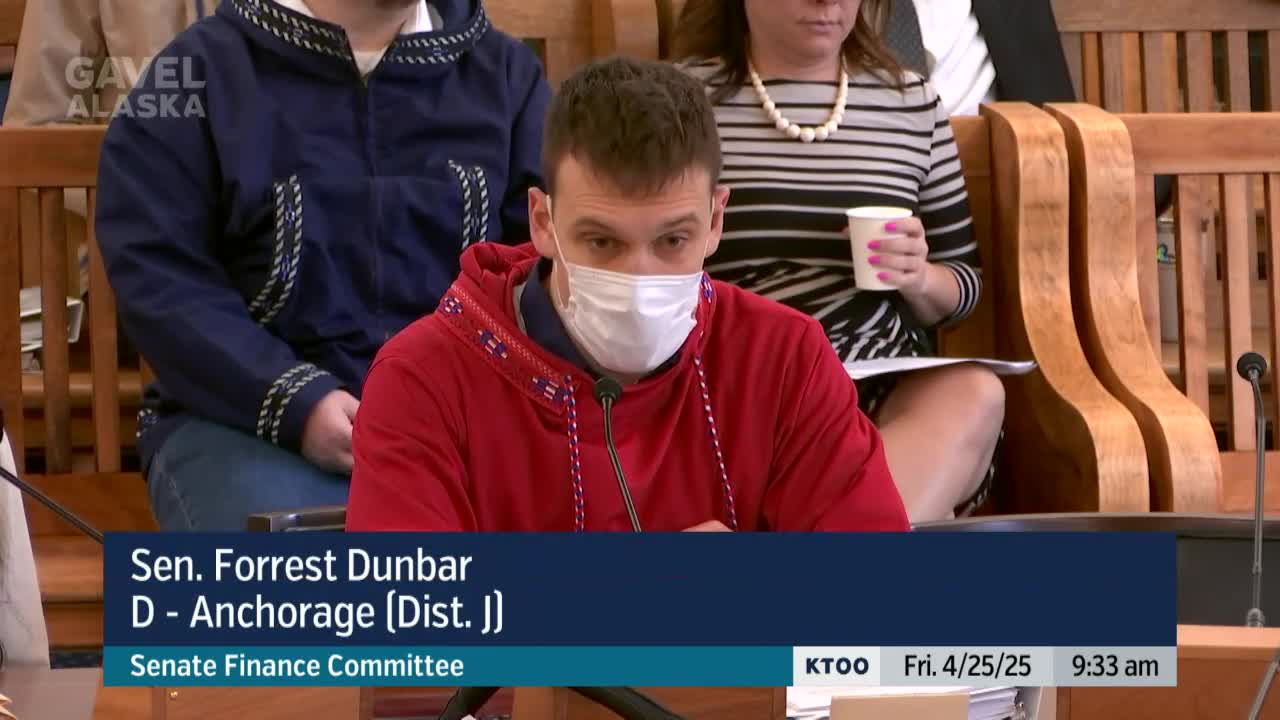Senate hears SB95 to expand child‑care assistance to more families; sponsor and providers stress workforce impact
Get AI-powered insights, summaries, and transcripts
Subscribe
Summary
The Senate Finance Committee on April 25 heard SB95, a bill to expand child‑care assistance eligibility and related program changes; the measure is being advanced as curative legislation after legal challenges to last year’s omnibus law.
Juneau — The Alaska Senate Finance Committee on April 25 conducted the first hearing on Senate Bill 95, legislation that would expand eligibility and flexibility for child‑care assistance. The bill is being re‑introduced as part of curative legislation tied to litigation challenging last year’s omnibus bill SB189.
Senator Forrest Dunbar, who presented the measure with Senate Majority legal staff, said the bill restates provisions that previously passed as HB89 and were enacted last year but now face uncertainty because of the single‑subject lawsuit. "This is already the law of the land, but its status has been thrown into some question because of the lawsuit involving the single subject rule," Senate staff explained during the hearing.
Invited witnesses and child‑care advocates described the measure as a workforce and family support priority. Stephanie Bergland, chief executive officer of SRED (a statewide child‑care resource and referral organization), told the committee that child‑care closures and staff shortages have undermined the sector and that SB95 would increase access by allowing more families to qualify. She said one large Anchorage provider, Bright Beginnings, "is closing its doors after 30 years," and warned the committee that closures would continue without sustained state investment.
Lisa Seidla (AEYC Southeast) said the bill would raise the income threshold so more families could access assistance and avoid decisions to forgo raises or promotions to keep benefits. Jenny Stuckey of Camp Fire Alaska and Tracy Shafer of Newnikins in Kotzebue also testified in support, describing how lack of affordable care reduces workforce participation and forces families to leave rural communities.
Senator Kiehl reviewed the fiscal note for SB95: committee staff read a fiscal submission from the Department of Health showing $6,092,200 included in the governor’s request for the coming fiscal year, described in committee discussion as composed of "225.1" in federal receipts matched dollar‑for‑dollar with a GF match and $5,642,000 in unrestricted general funds, and requesting two full‑time positions. Committee members asked for additional fiscal scenarios, including how costs would change if the eligibility threshold were set higher than 105% of state median income.
Evan Anderson, staff to Representative Fields, explained why the bill raises the ceiling from the former statutory 85% of state median income to 105%: the 85% level historically aligned with maximums for federal pass‑through grants; increasing to 105% reflects a new state investment and would extend assistance to roughly an estimated 18,000 additional children, Anderson said.
Committee members pressed for more information on duplicated statutory language in sections of the bill (sections 7 and 8 were cited as duplicative) and on whether the curative bills can be amended without risking the court‑related purpose. Emily Nauman of Legislative Legal Services advised the committee that the "safest" approach to negate the pending litigation is to reenact the language exactly, but that the legislature has latitude to make policy changes and the court would later determine the effect of those changes.
Senator Stedman expressed concern that the 105% threshold may still exclude many dual‑income families in metropolitan areas and asked staff to provide the fiscal impact of higher thresholds (for example, 150%) before the next hearing. The committee set SB95 aside for follow up and additional fiscal analysis.
No vote or amendment was recorded at the first hearing. Supporters asked the committee to restore additional operating budget funding the witnesses described as necessary to stabilize providers and implement the eligibility changes.
